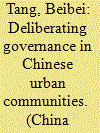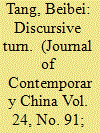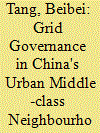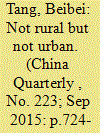|
|
|
Sort Order |
|
|
|
Items / Page
|
|
|
|
|
|
|
| Srl | Item |
| 1 |
ID:
144375


|
|
|
|
|
| Summary/Abstract |
This article examines the mechanisms of conflict resolution by public deliberation in Chinese urban residential communities. The analysis focuses on the interactions between three key actors of community life: Residents’ Committees (as the agent of the state), residents, and their representative organizations. Based on empirical data from three types of urban communities, the article finds that deliberation is more effective in communities where the power of Residents’ Committees over residents is weak, and deliberation also works better in communities with strong resident representatives who are able to mobilize information flows and to shape public reasoning. The findings suggest that, on the one hand, the governance structure of Chinese urban residential communities provides space for informal, unstructured public deliberation; on the other hand, deliberation also meets obstacles and dilemmas associated with representation, coordination and fostering understanding across social and economic divisions.
|
|
|
|
|
|
|
|
|
|
|
|
|
|
|
|
| 2 |
ID:
137368


|
|
|
|
|
| Summary/Abstract |
This article examines local governance and citizen participation in China through unstructured public deliberation. Case studies from two urbanized villages show that unstructured, informal public deliberation potentially leads to more autonomy and diverse channels for pursuing citizens' appeals at the local level, along with increased consideration given by local government to grassroots requests relating to practical governance matters. Although taking place outside formal political institutions, unstructured public deliberation can exert influences on policy or decision-making inside government organizations through well-coordinated transmission mechanisms between the public and the local government. During this process, well-resourced community organizations and actors play a vital role through their bridging functions to produce dynamic relations of deliberative governance. This bridging role serves to deliver deliberative outcomes from the public sphere to the decision-making authorities, and it also includes the collection of feedback on policy as well as the means to negotiate for policy adjustment by facilitating a policy implementation process.
|
|
|
|
|
|
|
|
|
|
|
|
|
|
|
|
| 3 |
ID:
173457


|
|
|
|
|
| Summary/Abstract |
This article examines the so-called “grid governance” scheme, a widely used grassroots governance strategy implemented in urban China in recent years. Drawing on data collected in multiple cities from 2011 to 2016, it analyses in what ways, and to what extent, the state employs the grid governance scheme to resolve neighbourhood conflicts and reinforce governance in Chinese urban middle-class neighbourhoods. The findings highlight complex interactions under the scheme among the residents, the state and market actors in neighbourhood governance, including the resident volunteers, residents’ social groups, residents’ committees and property management companies. By coopting middle-class resident volunteers, maximizing the existing political influence of the retired urban elites, and establishing Party organizations in middle-class residential communities, the grid governance scheme has become a major vehicle for resident mobilization and conflict resolution, and a key governance mechanism to reinforce the Party's leadership in middle-class neighbourhoods.
|
|
|
|
|
|
|
|
|
|
|
|
|
|
|
|
| 4 |
ID:
168021


|
|
|
|
|
| Summary/Abstract |
This article examines intermediary governance space in China’s urban neighbourhood governance. It identifies new local governance mechanisms and state-society relations through which urban and rural governance intertwine to interact with landless farmers during their introduction to and settlement in existing urban neighbourhoods. Through qualitative data collected in Suzhou, this study reveals the emergence of an intermediate governance space at the neighbourhood level, involving intermediary governance actors and organisations including agents of the Party-state, market groups, and social organisations. In the context of relocation communities, this article examines: how residents’ committees are put into place to carry out governance tasks; in what ways the land-losing farmers organise themselves and are mobilised to adjust to a new residential environment, and to what extent conflicts of interest are moderated within the neighbourhoods. The findings suggest dynamics of emerging intermediary governance space and actors in relocation communities. Performing as the liaison between the Party-state and the relocated villagers, the intermediary actors and organisations employ flexible practices and strategies in negotiating the relations between the state, the market, and the citizens produced through neighbourhood governance affairs.
|
|
|
|
|
|
|
|
|
|
|
|
|
|
|
|
| 5 |
ID:
142572


|
|
|
|
|
| Summary/Abstract |
China's urbanization has created a large number of urban villages which, although they have been transferred to urban administration, have maintained their collective economies. Using a comparative perspective, this article investigates how villagers, the village collectives and the urban administration organize community governance in three urban villages on the fringes of the cities of Guangzhou, Wuhan and Shenyang. The findings suggest that successful village collective shareholding companies play a leading role in community governance by providing villagers with economic and social welfare, subsidizing community administration services, and mobilizing residents. The comparative analysis also shows that village shareholding companies employ different mechanisms based on the varied histories of their village collective economies, the ability of the village collectives to mobilize resources, and the degree to which the village collectives are engaged in the grassroots administrative structure. The article argues that the “not rural but not urban” governance mode of the urban villages illustrates China's fragmented urbanization planning. At the same time, it illuminates the dynamics of state–society relations during China's urbanization and how landless villagers and village collectives respond to urban transformation by adopting different strategies to preserve their individual and collective interests.
|
|
|
|
|
|
|
|
|
|
|
|
|
|
|
|
|
|
|
|
|